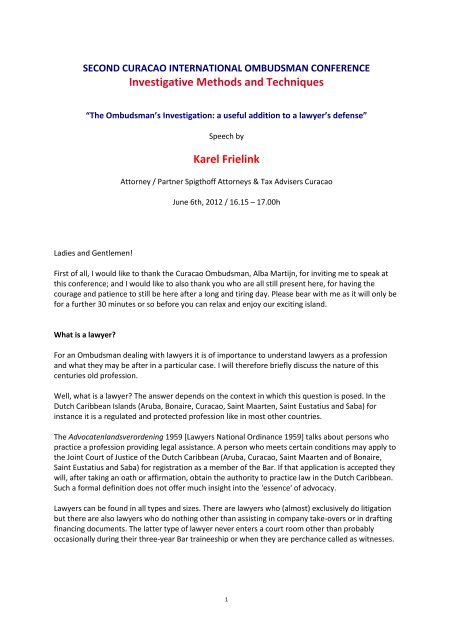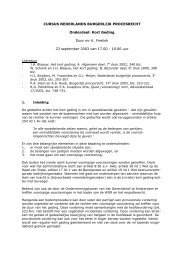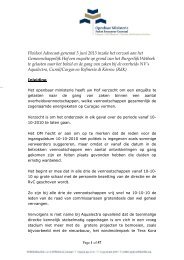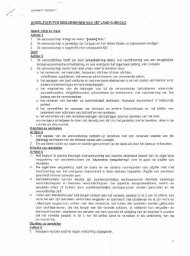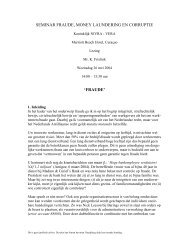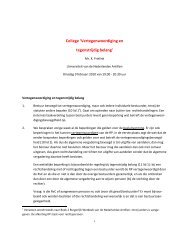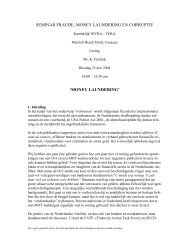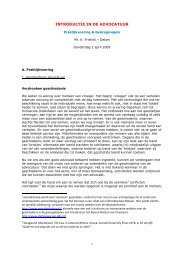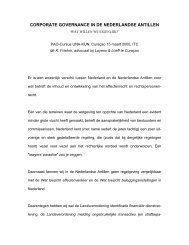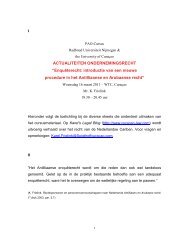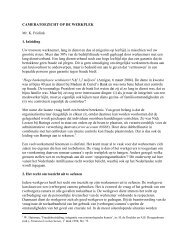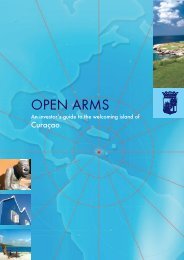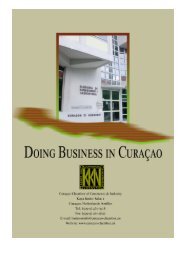Investigative Methods and Techniques Karel ... - Karel's Legal Blog
Investigative Methods and Techniques Karel ... - Karel's Legal Blog
Investigative Methods and Techniques Karel ... - Karel's Legal Blog
Create successful ePaper yourself
Turn your PDF publications into a flip-book with our unique Google optimized e-Paper software.
SECOND CURACAO INTERNATIONAL OMBUDSMAN CONFERENCE<br />
<strong>Investigative</strong> <strong>Methods</strong> <strong>and</strong> <strong>Techniques</strong><br />
“The Ombudsman’s Investigation: a useful addition to a lawyer’s defense”<br />
Ladies <strong>and</strong> Gentlemen!<br />
Speech by<br />
<strong>Karel</strong> Frielink<br />
Attorney / Partner Spigthoff Attorneys & Tax Advisers Curacao<br />
June 6th, 2012 / 16.15 – 17.00h<br />
First of all, I would like to thank the Curacao Ombudsman, Alba Martijn, for inviting me to speak at<br />
this conference; <strong>and</strong> I would like to also thank you who are all still present here, for having the<br />
courage <strong>and</strong> patience to still be here after a long <strong>and</strong> tiring day. Please bear with me as it will only be<br />
for a further 30 minutes or so before you can relax <strong>and</strong> enjoy our exciting isl<strong>and</strong>.<br />
What is a lawyer?<br />
For an Ombudsman dealing with lawyers it is of importance to underst<strong>and</strong> lawyers as a profession<br />
<strong>and</strong> what they may be after in a particular case. I will therefore briefly discuss the nature of this<br />
centuries old profession.<br />
Well, what is a lawyer? The answer depends on the context in which this question is posed. In the<br />
Dutch Caribbean Isl<strong>and</strong>s (Aruba, Bonaire, Curacao, Saint Maarten, Saint Eustatius <strong>and</strong> Saba) for<br />
instance it is a regulated <strong>and</strong> protected profession like in most other countries.<br />
The Advocatenl<strong>and</strong>sverordening 1959 [Lawyers National Ordinance 1959] talks about persons who<br />
practice a profession providing legal assistance. A person who meets certain conditions may apply to<br />
the Joint Court of Justice of the Dutch Caribbean (Aruba, Curacao, Saint Maarten <strong>and</strong> of Bonaire,<br />
Saint Eustatius <strong>and</strong> Saba) for registration as a member of the Bar. If that application is accepted they<br />
will, after taking an oath or affirmation, obtain the authority to practice law in the Dutch Caribbean.<br />
Such a formal definition does not offer much insight into the 'essence' of advocacy.<br />
Lawyers can be found in all types <strong>and</strong> sizes. There are lawyers who (almost) exclusively do litigation<br />
but there are also lawyers who do nothing other than assisting in company take-overs or in drafting<br />
financing documents. The latter type of lawyer never enters a court room other than probably<br />
occasionally during their three-year Bar traineeship or when they are perchance called as witnesses.<br />
1
So whether or not a lawyer is involved in litigation cases is not an adequate criterion for answering<br />
the question of what exactly a lawyer is. It is an established fact that a lawyer’s activities are<br />
concerned with the law. It is also an established fact that the activities of a lawyer are focused on<br />
representing the interests of the party instructing him: the client. Therefore a lawyer is by definition<br />
biased! In this respect a lawyer distinguishes himself from a judge or a public prosecutor or an<br />
Ombudsman.<br />
It is striking that a lawyer’s Court documents, which are obviously drawn up in the name of their<br />
clients, often include judgments, quite often giving a rather absolute impression <strong>and</strong> lacking in any<br />
subtleties. Only those facts are mentioned or only those Sections of an Act or parts of literature <strong>and</strong><br />
case law quoted which they think contribute to the substantiation <strong>and</strong> persuasiveness of their<br />
argument (probatio). So they only focus on a part of the reality known by them, while it is left to the<br />
counterpart’s lawyer (or the Public Prosecutor in a criminal case) to use all that is known to him that<br />
he thinks will benefit his position <strong>and</strong> negate the arguments of the counterparty (refutatio).<br />
It would be far from true to draw the conclusion from the above that lawyers are not interested in<br />
the tangible truth; however their focus will always be on the facts that support their client’s position.<br />
This is what they are expected to do, given the adversarial nature of a case before the courts; the<br />
court acts on information presented by a party in evidence.<br />
The Lawyer compared to an Ombudsman<br />
I will not go into too much detail regarding the role <strong>and</strong> nature of an Ombudsman <strong>and</strong> investigations<br />
carried out by him. The role of Ombudsman is known in many jurisdictions <strong>and</strong> they can, just like<br />
lawyers, be found in all types <strong>and</strong> sizes. Some are described as “Tarzan in the administration jungle”. 1<br />
I will merely attempt to only highlight a few of the differences between an Ombudsman <strong>and</strong> a<br />
lawyer.<br />
An Ombudsman is the obvious person for civilians to approach with their complaints about<br />
government <strong>and</strong> government agencies. The main task of the Ombudsman in Curacao is to serve the<br />
citizens (including legal entities) by conducting investigations into actions <strong>and</strong> practices of<br />
government <strong>and</strong> government bodies or agencies (both the executive <strong>and</strong> the legislative), by testing<br />
the merits of the manner in which a government body, authority, official or public servant has acted<br />
in a particular matter <strong>and</strong> by giving judgments as to whether those actions were improper or not.<br />
However, I personally also consider the function of an Ombudsman to be more that of a watchdog,<br />
keeping government in line, <strong>and</strong> guarding against excesses, abuse of power or corruption.<br />
An Ombudsman is impartial <strong>and</strong> independent. Such a complaint-resolution mechanism was <strong>and</strong> is<br />
needed to supplement the traditional means of seeking redress. This is particularly true for Curacao,<br />
because in many cases the government <strong>and</strong> government agencies are unresponsive, or even take or<br />
refuse to take administrative decisions contrary to the laws <strong>and</strong> regulations as well as contrary to<br />
court judgments. Recently, it was established that in over 120 cases the Curacao Minister of Justice<br />
simply refused to follow court orders to decide on applications - or on objections against notional<br />
refusals - filed by aliens who applied for a (temporary) residence permit. This is a good example of<br />
bad government practices. Even a Minister of Justice must abide by the law!<br />
1 Rob Jagtenberg en Annie de Roo, Interview met (oud-)ombudsman Migiel van Kinderen – een bemiddelende<br />
Tarzan, Nederl<strong>and</strong>s-Vlaams tijdschrift voor Mediation en conflictmanagement 2011 (15) 1, p. 5.<br />
2
An Ombudsman has no clients <strong>and</strong> is not paid to exclusively defend the interests of a client. An<br />
Ombudsman has no boss. No one can tell an Ombudsman to refrain from investigating certain<br />
matters because they are or might be politically sensitive. I guess that many of you know by<br />
experience that from time to time there are political forces that in subtle or less subtle ways try to<br />
prevent an Ombudsman from functioning correctly. We have seen that here in Curacao <strong>and</strong> in the<br />
Dutch part of Saint Maarten as well. The only real power one has as an Ombudsman is the power to<br />
investigate. My advice: use that power <strong>and</strong> show that you cannot be influenced, that you cannot be<br />
intimidated, <strong>and</strong> that you are unstoppable.<br />
A lawyer is not an investigator. Generally speaking, he has no investigative skills, <strong>and</strong>, as we<br />
concluded before, he is not, at least not always, interested in the whole truth. An Ombudsman has,<br />
or should have, much easier as well as greater access to government records than a lawyer. An<br />
Ombudsman can find information that was not available to a lawyer.<br />
Ombudsman beneficial to lawyers <strong>and</strong> their clients?<br />
In several jurisdictions the law provides that, with certain exceptions, a statement made or an<br />
answer given by a person during an investigation by the Ombudsman, <strong>and</strong> a report or<br />
recommendation of the Ombudsman, is inadmissible in evidence in a court or in any other<br />
proceeding.<br />
As far as legal proceedings in the Dutch Caribbean are concerned, our laws do not prohibit an<br />
Ombudsman’s report from being introduced into a civil lawsuit. Based on an Ombudsman’s report<br />
one may report a case to the police or the public prosecutor’s office. It should be noted, however,<br />
that the Curacao Ombudsman is prevented from initiating an investigation, or from continuing to<br />
investigate a matter, if (<strong>and</strong> once) the matter at h<strong>and</strong> is subject to civil, administrative or penal<br />
proceedings, or already has resulted in an administrative decision.<br />
Unlike, for example, Engl<strong>and</strong> <strong>and</strong> Denmark, in the Dutch Caribbean <strong>and</strong> the Netherl<strong>and</strong>s,<br />
conflicts between the administration <strong>and</strong> citizens are dealt with by specialized administrative<br />
courts.<br />
The Ombudsman may also decide not to start an investigation if the complainant could have sought<br />
recourse in administrative proceedings, but has not done so. This is left to the discretionary power of<br />
the Ombudsman.<br />
It is therefore of importance that a lawyer carefully assesses whether it is a good strategy to first file<br />
a complaint at the Ombudsman <strong>and</strong> subsequently use the evidence thus gathered in court<br />
proceedings for damages.<br />
Lawyers <strong>and</strong> their clients may benefit from the Ombudsman’s office in several ways. The<br />
Ombudsman is able to carry out an investigation without the client having to pay for it. And this is<br />
even better than “Going Dutch”, with the bill evenly shared between all parties (like at a restaurant).<br />
Generally, such an investigation will be more thorough than investigations carried out by lawyers. As<br />
mentioned previously, lawyers are not investigators <strong>and</strong> are as such ill-equipped.<br />
3
Government <strong>and</strong> government bodies are under an obligation to provide access to their records. A<br />
lawyer may eventually get access to the same records albeit after lengthy proceedings <strong>and</strong> against<br />
high costs.<br />
The mere fact that the investigation will be carried out independently <strong>and</strong> systematically (<strong>and</strong> in<br />
many cases rather quickly) by an impartial expert is in itself of relevance. It is all about credibility.<br />
Another important observation is that involving an Ombudsman or his report being presented to<br />
government or the relevant government agency may help in solving the dispute out of court. We<br />
should not underestimate the potential power of an Ombudsman in terms of dispute resolution. To<br />
ensure successful dispute resolution it is essential that, for instance, cabinet Ministers <strong>and</strong> senior<br />
executive civil servants provide the political will <strong>and</strong> support to such initiatives. 2 The question is of<br />
course, how do we make that happen? How do we convince or force the government to live up to<br />
principles of good administration? That will often be frustratingly difficult!<br />
Courts <strong>and</strong> Ombudsman reports<br />
An Ombudsman determines whether a complaint is justified or not. If the Ombudsman finds that a<br />
complaint is justified or has merit, he may decide to try <strong>and</strong> persuade the government or<br />
government agency to change its policy or decision. My topic, however, is about an Ombudsman<br />
report resulting from a complaint primarily filed to establish whether there were sufficient grounds<br />
to initiate legal proceedings in a regular court. A lawyer <strong>and</strong> his client may decide to submit the<br />
Ombudsman report to the court, in the course of proceedings, as evidence that supports the client’s<br />
position. 3 Such a report is, however, not legally binding any way whatsoever, despite the fact that<br />
reports made by Ombudsmen are sometimes labelled as “Ombudsprudence”. 4<br />
I will briefly discuss our rules on evidence in civil matters. According to Dutch Caribbean law on civil<br />
procedure, whoever asserts a fact must prove it. In other words, any party will be required, in<br />
principle, to offer evidence to prove the facts that he has asserted or been required to assert if he is<br />
to rely on them for legal purposes. A Dutch Caribbean court may only base its decision on facts. An<br />
alleged fact that is not disputed by the parties is considered to be such a fact, even if it does not<br />
correspond with reality. For example, if both parties state that they were involved in a fight in<br />
Curacao, the court will assume the correctness thereof, although both parties know that the fight<br />
was actually in Bonaire.<br />
In principle, a Dutch Caribbean court is free to evaluate the evidence before it. This is true, in<br />
particular, when an Ombudsman report is brought into a case to support the position of one of the<br />
parties. In this respect the quality of the research done by the Ombudsman, the substantiation of his<br />
findings <strong>and</strong> the independence of the investigation will play an important role. However, even in<br />
these circumstances the courts have the last word as to whether an Ombudsman has come to the<br />
right conclusion. It goes without saying that an Ombudsman can also make mistakes, for instance, by<br />
not properly gathering the facts, misinterpreting facts, or jumping to conclusions. 5<br />
2 See Rob Jagtenberg en Annie de Roo, Interview met (oud-)ombudsman Migiel van Kinderen – een<br />
bemiddelende Tarzan, Nederl<strong>and</strong>s-Vlaams tijdschrift voor Mediation en conflictmanagement 2011 (15) 1, p. 7.<br />
3 See Central Appeals Tribunal, 19 February 2004, LJN: AO4171 [Municipality of Amsterdam vs X].<br />
4 Philip Langbroek, Ombudsmanwerk tussen overheid en burger, AA 56 (2007) 11, p. 910.<br />
5 See for example Appeal Court ‘s-Hertogenbosch, 6 September 2011, LJN: BT2233 [X vs Loxodrome Architects<br />
& Planners].<br />
4
There is another important observation to be made. The fact that an Ombudsman finds a complaint<br />
justified does not necessarily mean that the government or government agency committed a tort<br />
a.k.a. a wrongful act (in Dutch: ‘onrechtmatige daad’). Whether or not a tort has been committed<br />
must be assessed on the basis of the (Curacao) Civil Code.<br />
The Appeal Court of The Hague, 6 for instance, ruled that even though the Ombudsman had<br />
concluded that the Dutch tax authorities acted unfairly by not giving correct information in a<br />
particular matter to certain parties, this did not automatically mean that the State of the Netherl<strong>and</strong>s<br />
had acted unlawfully against these parties, who had initiated legal proceedings against the State.<br />
Under the laws of Curacao the result would not have been different.<br />
The District Court of The Hague, 7 to mention another example, ruled that even though the<br />
Ombudsman had reached the conclusion in his report that the State of the Netherl<strong>and</strong>s had acted<br />
improperly, this improper behavior was not necessarily also wrongful <strong>and</strong> that there was therefore<br />
not necessarily an obligation to compensate the damages.<br />
So even if the Ombudsman went as far as to conclude that a government body had committed a tort,<br />
which I guess will not happen often given the assessment framework of the Ombudsman, it is<br />
ultimately up to the courts to interpret the facts <strong>and</strong> decide whether this is indeed the case. In this<br />
sense, an Ombudsman’s report only provides an opinion, albeit in many cases a learned opinion.<br />
In many cases an Ombudsman deals with administrative decisions or the lack thereof. It goes without<br />
saying that in his reports the Ombudsman will make reference to the principles that have been<br />
developed by the courts to help them judge administrative behaviour in conflicts with citizens. In<br />
those cases it is also up to the court to decide whether or not the Ombudsman came to the right<br />
conclusions.<br />
In another case, there was a dispute between a client <strong>and</strong> his insurance company about certain<br />
premiums charged. 8 There had previously been discussion about the reasonableness of such<br />
premiums <strong>and</strong> based on an Ombudsman report, settlement agreements had been concluded<br />
between several insurance companies <strong>and</strong> consumer organizations. In this particular case, the court<br />
ruled that lacking any alternative st<strong>and</strong>ard, it would follow the agreements mentioned, which, as<br />
said, were based on the Ombudsman report.<br />
Based on the court cases reviewed, I get the impression that Ombudsman reports are taken seriously<br />
by the courts. Perhaps one can impress a girl by being in excellent physical shape, but to impress a<br />
court is not that simple. It requires experience, knowledge, authority <strong>and</strong> in particular the ability to<br />
draft a report supported by verifiable evidence, sound reasoning <strong>and</strong> common sense.<br />
6 Appeal Court of The Hague, 14 December 2010, LJN: BO7396 [X B.V. vs State of the Netherl<strong>and</strong>s]. Also see<br />
District Court Assen, 19 February 2007, LJN: AZ8836 [X vs Regionaal Politiekorps Assen] <strong>and</strong> District Court ‘s-<br />
Hertogenbosch, 23 June 2004, LJN: AP5823 [X vs Regionaal Politiekorps Brabant-Noord].<br />
7 District Court of The Hague, 27 July 2011, LJN: BU1282 [Eurolines vs State of the Netherl<strong>and</strong>s]: “Bij de<br />
beoordeling van deze vordering wordt vooropgesteld dat het oordeel van de Nationale Ombudsman dat een<br />
klacht gegrond is (en dat het overheidsorgaan in kwestie dus in zoverre onbehoorlijk heeft geh<strong>and</strong>eld), niet<br />
zonder meer betekent dat de overheid in dat opzicht onrechtmatig heeft geh<strong>and</strong>eld en dientengevolge<br />
schadevergoeding moet betalen”.<br />
8 District Court of The Hague, 13 April 2010, LJN: BL9733 [X vs Aegon Spaarkas].<br />
5
Final remark<br />
Why do some people think that being a 'lawyer' is the best profession, or better still: the most<br />
beautiful vocation? Why do some people stake everything on becoming a lawyer? Do they not know<br />
the story, true or untrue, set in the first half of the second millennium? 9<br />
The lawyers from that time required a patron saint. They delegated Saint Ivo (a.k.a. Saint Yvo; 1253-<br />
1303) to travel from Brittany to Rome, more in particular the Lateranum, in order to apply for this<br />
patron saint to His Holiness. The request was honoured on the underst<strong>and</strong>ing that Ivo could choose<br />
one of the statues erected on the square but only after he was blindfolded.<br />
Under loud encouragement of the prelates present he made his way until in the end he came to a<br />
halt. He placed his h<strong>and</strong> on a statue <strong>and</strong> declared that he had made his choice. His blindfold was<br />
removed <strong>and</strong> to the amusement of all spectators he appeared to have chosen a statue of the devil.<br />
Deeply sad he returned as you underst<strong>and</strong> empty-h<strong>and</strong>ed to Brittany to die there soon after. In the<br />
end Saint Ivo, who as a professional lawyer served as an example for many, was canonized by Pope<br />
Clemens VI. His epitaph contributed to the fact that Saint Ivo would from then on be the patron saint<br />
of lawyers. What did this epitaph read?<br />
Thank you very much!<br />
Sanctus Ivo erat Brito, Advocatus et non latro. Res mir<strong>and</strong>a populo<br />
(Saint Ivo was a Breton; a lawyer but not a thief. Something the people were surprised about)<br />
9 See <strong>Karel</strong> Frielink <strong>and</strong> Mirto F. Murray, Twee Curacaose Meesters [Two Curacao Masters] , Nijmegen: Wolf<br />
<strong>Legal</strong> Publishers 2011, p. 4-5.<br />
6


